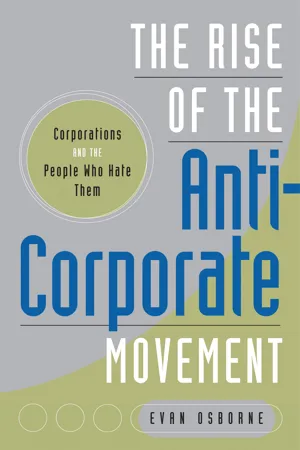
The Rise of the Anti-Corporate Movement
Corporations and the People who Hate Them
- 264 pages
- English
- PDF
- Available on iOS & Android
About This Book
Against the backdrop of Enron and the other high-profile cases of corporate malfeasance, it is easy to paint today's executives as villains and blame big business, and corporations generally, for a wide array of social ills. Is the criticism warranted? Not quite, says Evan Osborne, as he traces the history of anti-corporate sentiment and assesses the fever-pitch hatred, by some, of all things corporate. While not perfect angels, Osborne argues, corporations confer many more benefits to society than ills. Moreover, they are an essential engine of human progress, and longstanding legal principles are more than adequate to address their flaws. And that makes the rising tide of anti-corporate sentiment dangerous. Why? Look at the facts: Large corporations inspire both awe and fear. On the one hand, they create jobs, introduce scientific and technological breakthroughs, open up borders through trade, and provide indispensable products and services that make life easier. On the other hand, many think they undermine the will of the people, encourage bribery and corruption, finance oppressive regimes, ruin values and culture, befoul the environment, and encourage economic inequality. It was no accident that the terrorists of September 11 targeted the World Trade Center, an iconic symbol of American financial power. In this provocative book, Evan Osborne pulls back the curtain to illuminate how corporations have evolved as an essential element of society, and how opposition to them has developed out of proportion—a fire fanned by anti-business activists, the media, and other groups. He sets the record straight, explaining how corporations work, how they have evolved in the context of other institutions, the net benefits they provide—and how to deal with their undeniable imperfections. At the same time, he shows how anti-business claims have become more strident and where these arguments fail to stand up to scrutiny.
Frequently asked questions
Table of contents
- Preface
- 1. The Concept of the Corporate Regime
- 2. A Brief History of the Corporation
- 3. A Brief History of the Anti-Corporate Movement
- 4. Corporate Economics
- 5. Corporate Power
- 6. Corporate Globalization
- 7. Corporate Culture
- 8. Corporate Conclusions
- Notes
- Index